Movie Review: IN BRUGES (2008)
![]()
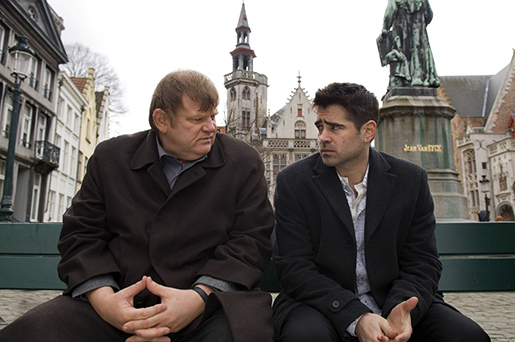
Murderers… Twisting and Turning… in a “Fairy Tale Place”…
In early February 2008, the debut of writer-director John McDonagh floored me. In Bruges started a trend following David Fincher’s Zodiac in 2007 that at least one movie released in February was a masterpiece. What surprised me most about this gutsy film was how elegantly it focused on two Irish hit men from London. The youngest is Raymond (Colin Farrell), a cocky bloke who comes across as curt to others (“You’re a bunch of fucking elephants!”), but he isn’t mean-spirited, just thoughtless. Ken (Brendan Gleeson), a jovial soul masking a deep sadness, accompanies Raymond as his mentor in their line work and acts in some ways like a surrogate father figure. In a moment of great duress, Ken breaks the silence by reassuring Raymond, “You look good.”
For perhaps the first time in Raymond’s life, he is affected by gnawing guilt over an unforgivable accident he caused. His manic depression has made him suicidal. Their relationship is a fascinating because Farrell and Gleeson work so effortlessly together. A comradery of wit, pain and compassion. Killing for hire to Ken is surmised simply, “It’s what I do.”
Their boss Harry Waters (Ralph Fiennes) sends them away to hide in Bruges (“It’s in Belgium.”) after the last job got botched. With his nose in the guide book, Ken explains that “Bruges is the most well preserved medieval town of all of Belgium apparently.” On a wintry canal ride, Ken marvels at the old buildings and churches while Raymond sits with his shoulders hunched, bored out of his mind. Here Bruges is a setting closest to one can ever get to purgatory on Earth. It’s a perfect stage for these killers to reflect and act upon their trespasses. At one point in the Basilica of the Holy Blood, Ken accuses Raymond of “Throwing a fucking moody like a five-year-old who’s dropped all his sweets!”
While standing before Hieronymus Bosch’s oil painting The Garden of Earthly Delights, Raymond is compelled to ask Ken about his views of the afterlife. Ken is at a loss of words at first. A lesser movie would have moved on from there. Instead, we go outside where Ken honestly tries to answer Raymond’s questions. It is a perfect scene. Note how Raymond demonstrates his self-interest when he speculates about a boy never able to go to Bruges and says “I don’t know why.” These characters are so well-written that their own point-of-view is always evident.
Like Danny Devito’s The War of the Roses (1989) and Todd Solondz’s Happiness (1998), In Bruges embraces its gallows humor and still faces its consequential tragedies squarely. Ken’s annoyance with a ticket seller of a bell tower even reflects a scene in the Coen brothers’ Fargo (1996) where Carl (Steve Buscemi) tries to get out of paying parking fee. There are echoes of David Mamet in the dialogue for instance as an American tourist Raymond angered shouts at him, “You know you’re just the rudest man! The rudest man!”
One night Raymond falls hard for a girl on a film set named Chloe (Clémence Poésy), an adorable blonde with bite. On a dinner date, Raymond scoffs that he would have the good sense not to make fun of Chloe’s hometown and then proves otherwise by confirming if “Bruges is where all child-abuse murders have been happening.” Because any opportunity is too good for Raymond to pass up, he smiles mischievously, hopes for the best and volunteers a Belgian joke. Yes, it is tasteless, but it also benefits from being tasteless and funny. Chloe’s response carries a bluntness that turns screwy, which makes director McDonagh out to be a sadist every great filmmaker should hope to become. What helps the romance is that Raymond is uninhabited in his sincerest praising of Chloe who is deeply touched. They’re sweet together.
McDonagh performs a difficult task of crossing the line and getting approval for being smart about it without apology. The film masterfully crisscrosses between dark comedy and even darker drama. Those two aspects don’t dilute, they complement one another to their utmost effectiveness. It is one thing to get laughs about dwarfs (“They’re filming midgets!”), but it is more worthwhile to depict Jimmy (Jordon Prendict), the dwarf in question, as a flawed and richly rounded character (“It’s just…cocaine.”). It is important to note that Raymond never condescends to Jimmy, he is fascinated with him. A thumb’s up in one shot is a candid gesture. During a silly conversation over drugs about a war between the blacks and the whites, Ken brings up a startling admission that changes the tone in an instant.
Beginning slyly with a few seconds from Orson Welles’ three-minute take regarding a ticking time bomb in Touch of Evil (1985), there is also a virtuoso five-minute shot of a phone conversation with Harry from Ken’s end. It starts amusingly enough with Ken covering up Raymond’s absence by carrying on a pretend conversation for Harry’s sake (“That don’t mean he’s gone. Go check outside the door.”), but a revelation at the last minute becomes as serious as cancer.
Bruges is populated with an assortment of characters who strengthen the allegory-like semblances of the “fairytale place.” Eirik (Jérémie Renier from L’Enfant, 2005), a skinhead derided as a “poof” comes across a bitter, impish underling. A very pregnant brunette (Thekla Reuten, who is very effective) who runs the quaint hotel and strikes Ken quietly as a better life unrealized. Eric Godon as Yuri, a sinister gun dealer who gets great mileage out of the word “alcoves”. The always dependable Elizabeth Berrington plays a Harry’s wife and has a great line, “Tell me you’re bringing the fellas with you.” Zeljko Ivanek, a character actor as prolific as Richard Jenkins, plays a bitter tourist who should have dined in the no-smoking section. Ciarán Hinds makes a short appearance and it is always great to see Ciarán Hinds.
The devil of this piece, Harry Waters, makes his appearance in the last one-third of the film. Like the Mr. Woo character syndrome that Orson Welles explained as the case of a character who is often mentioned but never seen, then that is the character that will most permeate in the audience’s minds. Ralph Fiennes plays Harry as a short-tempered, elaborately drawn villain bordering on joy. Harry follows suite making outrageously politically incorrect statements. When he surveys a display of uzis, he scoffs “I’m not from South Central, Los fucking Angeles. I didn’t come here to shoot twenty black ten-year-olds in a fucking drive-by.” He is classy enough to bribe someone with a hundred dollar bill, but would never stand for disrespect. His twisted, however ethical mindset is as compelling as the Casino Boss played exceptionally by Alec Baldwin in the underrated film The Cooler (2003) where he thinks breaking the knee cap of a friend who owes him money is a courtesy. As a killer, Harry would have nodded with recognition if he had heard the words of Thomas Ripley regarding the insignificance of a murdered man: “It’s one less car on the road. It’s a little less noise and menace.”
The music by Carter Burwell is very memorable and elegiac with hints from his past scores like Gods and Monsters (1998) and Being John Malkovich (1999). Occasionally, the poignant soundtrack makes bold surprises by incorporating momentous dread as we follow Harry marching by the bridges like a tall, demonic figure. Another rousing choice involves an electrical guitar playing off of a shoot-out. In the day, cinematographer Eigil Bryld captures a cold, however picturesque sensibilities of the town surrounding its characters in the fog. When filmed at night, Bruges exudes a warm, yellowish glow. Jon Gregory exercises great film economy that complements the actors and the writing. Just as effective is a slow dissolve that lasts ten seconds over two dead bodies. One of those bodies fades into the painting of clergyman’s hand giving a letter to a skeletal one – a visual transition of life to death.
Late in the film, Harry gets very, very angry with Ken and they spot each other outside the patio of a Bruges pub. Reader, when those two men sat down to talk over their pints, I wanted to start applauding. They have a history. They bear their souls while their revolvers stay concealed behind their jackets. A lesser movie would have started with mindless gunfire. They argue violently. One of the film’s best gut-busters involves Harry leaning intensely toward Ken, only to pick up his glass of imported beer from off-screen over to his lips and then he takes a sip. Eventually, there is a shootout, but it is earned because the situation was thoughtfully built up and what happens after is completely unexpected. The violence is sparse, but horrifically gory as it should be. The drama has its clutches into a reality that seems plausible, even immediate. For instance, Raymond explains that he went to a Burger King to wash his blood-drenched hands after his first assassination. This is the stuff of Quentin Tarantino.
As the film approaches its climax to The Dubliners’ song On Raglan Road, the characters are trapped by their grave circumstances and forced to perform grand gestures that elevate them into a heightened, more fantastic realm. One rises to savior status by making one hell of a leap. Another punishes himself as the result of great irony at the cost of punishing another in turn: “Ah! I see.” They make choices that have considered their personalities acutely and have surprised them and us as well. Cause and effect here has such colourful irony to match its great sadness.
UPDATE: July 8, 2008
Having watched the otherwise excellent scenes on the cutting room floor of the In Bruges DVD, I admire the tough decisions made for an effectively put together final cut. There is a deleted scene that is so good that it ranks with the one in Oliver Stone’s Natural Born Killers (1994) where Mickey and Mallory on trial facing witness Grace Monroe (a young Ashley Judd). The scene in question involves a flashback of a young, machete-wielding Harry in a police station.
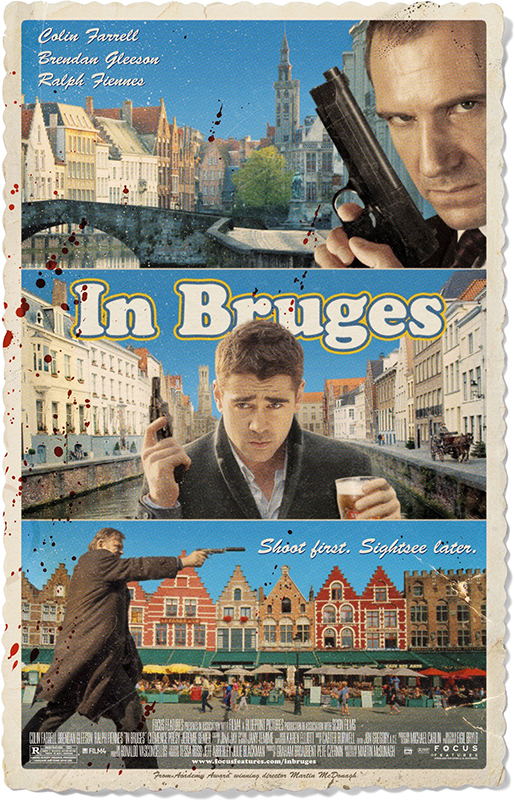
© 2008 – 2024, CINELATION | Movie Reviews by Chris Beaubien. All rights reserved.


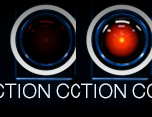











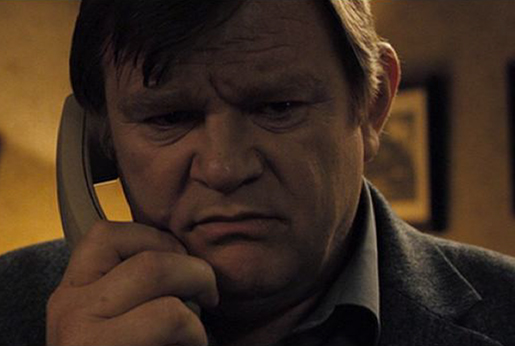

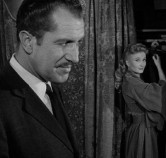
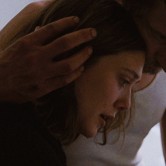

Pingback: Rainbeau Creative Blog | New Position: Film Critic